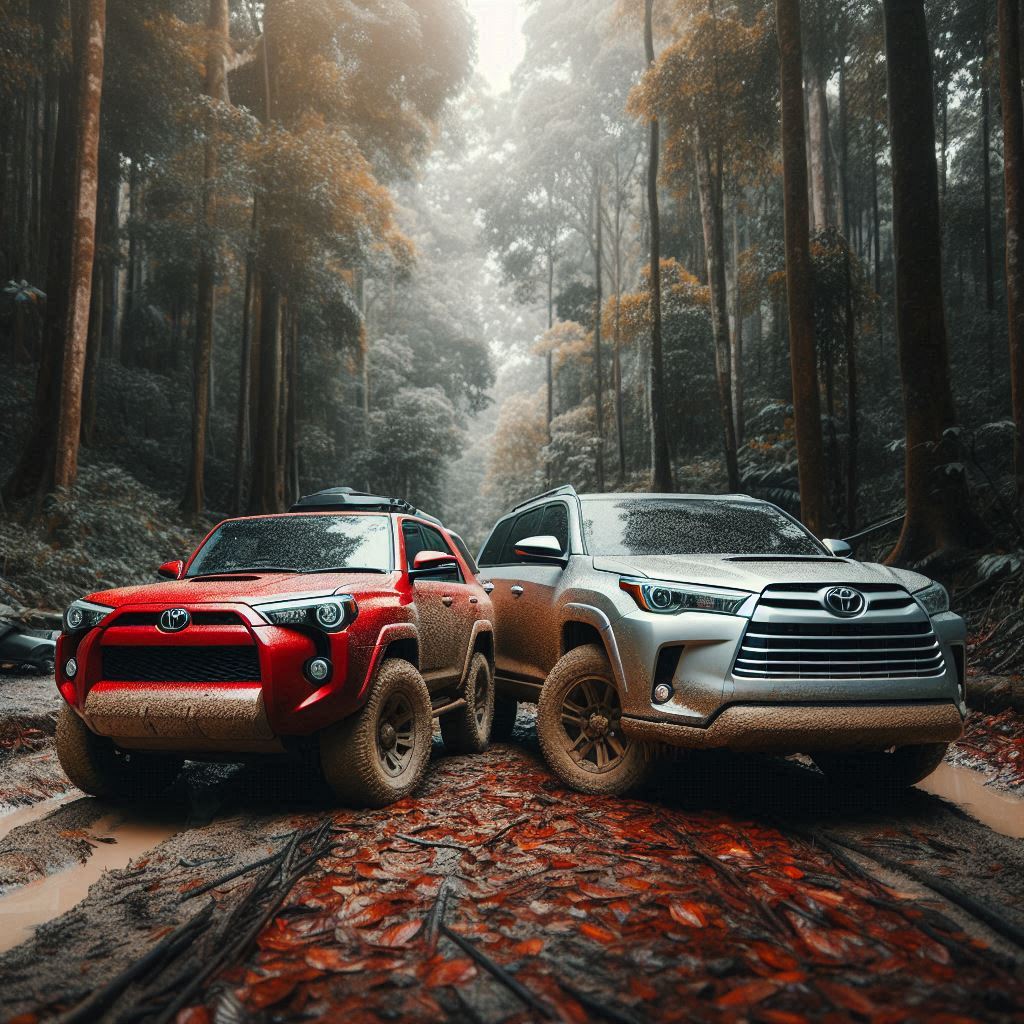4Runner vs. Highlander: Which Toyota SUV is Right for You?
Introduction
When it comes to choosing a Toyota SUV, the 4Runner and Highlander are two popular options that often come up in discussions. Both vehicles offer unique features and cater to different needs, making it essential to understand their differences before making a decision. In this article, we’ll compare the Toyota 4Runner and Toyota Highlander across various aspects, including performance, interior features, safety, and overall value.
Performance and Capability
Toyota 4Runner
The Toyota 4Runner is renowned for its off-road capabilities and rugged performance. Its body-on-frame construction and available four-wheel drive (4WD) make it a favorite among adventure enthusiasts. The 4Runner is powered by a 4.0-liter V6 engine that delivers 270 horsepower and 278 lb-ft of torque, providing ample power for challenging terrains and towing.
Off-Road Features:
Kinetic Dynamic Suspension System (KDSS): Enhances off-road stability by adjusting the suspension in real-time.
Multi-Terrain Select: Allows drivers to choose from various terrain settings to optimize traction and control.
Crawl Control: Provides automated throttle and brake control to navigate difficult off-road conditions.
Toyota Highlander
The Toyota Highlander is designed more for on-road comfort and efficiency, making it a great option for families and daily commutes. It features a unibody construction, which contributes to a smoother and quieter ride compared to the 4Runner. The Highlander comes with a 3.5-liter V6 engine that produces 295 horsepower and 263 lb-ft of torque, offering a balance of power and fuel efficiency.
Engine Options:
3.5-liter V6: Standard engine providing a robust performance for daily driving and occasional towing.
Hybrid Powertrain: Available in the Highlander Hybrid, combining a 3.5-liter V6 with electric motors for improved fuel efficiency and reduced emissions.
Interior and Comfort
Toyota 4Runner
The interior of the Toyota 4Runner emphasizes durability and functionality, reflecting its off-road heritage. It features high-quality materials and an intuitive layout, though it may not be as upscale as the Highlander’s cabin. The 4Runner offers seating for up to seven passengers, with available third-row seating in certain trims.
Interior Features:
Cargo Space: Generous cargo capacity with ample room for gear and equipment.
Technology: Includes an available touchscreen infotainment system with smartphone integration and navigation.
Toyota Highlander
The Toyota Highlander excels in providing a comfortable and refined interior, making it a preferred choice for families. It features a more modern design with premium materials and a range of advanced technology. The Highlander offers seating for up to eight passengers, with a more spacious third-row compared to the 4Runner.
Interior Features:
Premium Materials: High-quality upholstery and finishes for a more luxurious feel.
Technology: Comes equipped with a larger touchscreen infotainment system, Apple CarPlay, Android Auto, and an optional premium audio system.
Safety and Driver Assistance
Toyota 4Runner
The Toyota 4Runner comes with a comprehensive set of safety features, including standard driver assistance technologies. However, its focus on off-road capability means some advanced safety features are optional rather than standard.
Safety Features:
Toyota Safety Sense P (TSS-P): Includes adaptive cruise control, lane departure warning, and automatic high beams.
Additional Safety Features: Available parking sensors and a rearview camera for enhanced safety.
Toyota Highlander
The Toyota Highlander places a strong emphasis on safety and includes a wide array of standard driver assistance features. Its advanced safety technologies contribute to a higher overall safety rating.
Safety Features:
Toyota Safety Sense 2.5 (TSS-C): Includes pre-collision system with pedestrian detection, lane tracing assist, road sign assist, and adaptive cruise control.
Additional Safety Features: Available blind-spot monitoring, rear cross-traffic alert, and a 360-degree camera system.
Value and Pricing
Toyota 4Runner
The Toyota 4Runner generally has a higher starting price compared to the Highlander, reflecting its rugged design and off-road capabilities. The 4Runner’s price can increase significantly with additional off-road packages and features.
Pricing Range:
Base Model: Starts around $38,000
Fully Loaded: Can exceed $50,000 with additional features and trims
Toyota Highlander
The Toyota Highlander offers a more competitive pricing structure, especially for those seeking a family-friendly SUV with modern features. The availability of a hybrid model also adds value for those looking for better fuel efficiency.
Pricing Range:
Base Model: Starts around $37,000
Fully Loaded: Can reach up to $50,000 with premium trims and hybrid options
Conclusion
Choosing between the Toyota 4Runner and Toyota Highlander ultimately depends on your specific needs and preferences. If you prioritize off-road capability, rugged performance, and a durable build, the 4Runner is the ideal choice. On the other hand, if you’re looking for a comfortable, family-oriented SUV with advanced technology and better fuel efficiency, the Highlander stands out as a strong contender.
Both vehicles offer exceptional reliability and build quality, reflecting Toyota’s commitment to excellence. By considering factors such as performance, interior features, safety, and pricing, you can make an informed decision that best suits your lifestyle and driving needs.
